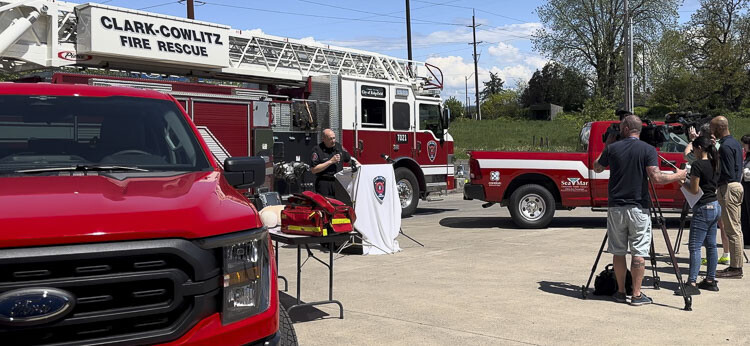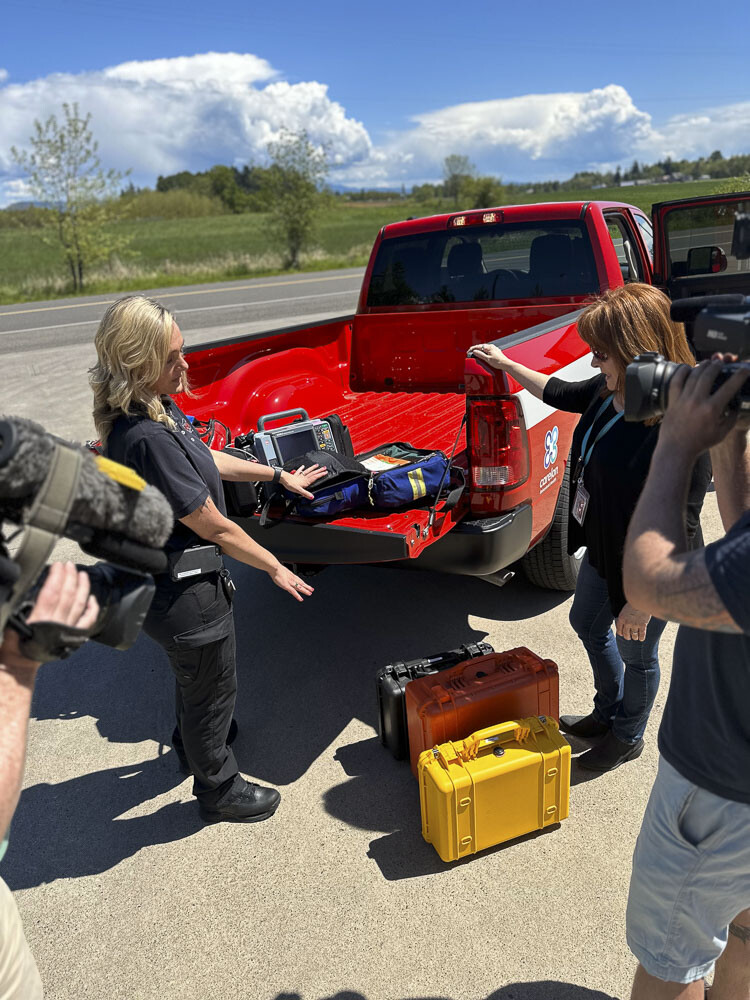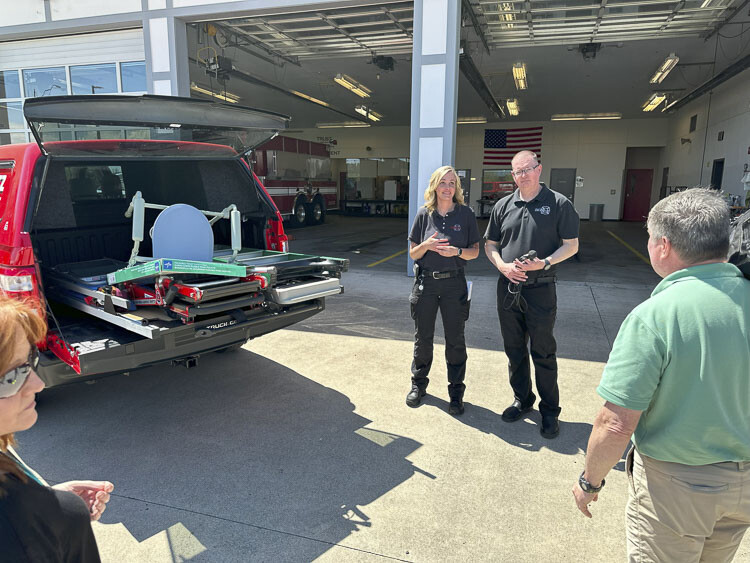
The pilot program is the first of its kind in the state, pairing a specialized, behavioral health professional with an experienced paramedic to respond to 9-1-1 calls
Clark-Cowlitz Fire Rescue has announced a strategic partnership with the Behavioral Health Service community to offer a new critical service in the Fire District. This pilot program aims at addressing a growing need for Behavioral Health Crisis and Mental Health Support. This innovative partnership is funded and supported by Carelon Behavioral Health in partnership with SeaMar-CSNW for service delivery. This Co-Response pilot program is the first of its kind in the state of Washington, pairing a specialized, behavioral health professional with an experienced paramedic to respond to calls that come through the 9-1-1 system.
As the regional Behavioral Health Administrative Services Organization (BHASO), Carelon Behavioral Health is charged with the responsibility of improving the experiences of individuals in crisis and the efficiency and efficacy of the crisis system that serves them. This pilot Co-Responder Program is aimed at addressing the growing demand for response to behavioral health emergencies and non-emergency health needs through the 9-1-1 system. The new Co-Responder program helps to support the 9-1-1 system that is already taxed by ever increasing call volumes.

Co-response models like this pilot program can speed up the access to appropriate care for people in need, while keeping other resources available for Emergency Response. Providing the right resource at the right time is key to ensuring effectiveness and efficiency of the emergency response system and limited health care resources.
Leah Becknell, account director with Carelon Behavioral Health, said, “This is an exciting opportunity for us to support a new and unique public-private partnership that will help address a significant need in the community, while serving an important mission that is common to the partners.”
The new Co-Response team will include a trained mental health professional and a certified paramedic to provide a non-traditional emergency resource with a specialized focus and improved ability to connect patients and families with appropriate support resources in a timely manner. The Co-Response team is operating at 40 hours per week with plans to double that availability in the coming months.
The new unit has a target response area of the CCFR Fire District, including the cities of La Center, Ridgefield, and Woodland along with unincorporated North Clark County. Response to 9-1-1 calls involving behavioral health crisis, substance use disorders, and low acuity mental health and medical needs will be the focus of the response unit. By addressing the unique needs of people experiencing behavioral health crisis or needing mental health assistance at their time and place of need, we can help connect people to appropriate resources outside of the Hospital Emergency Room.

Fire Chief John Nohr remarked that “The program has already proven benefits for local Fire, EMS, and Law Enforcement by keeping limited response resources available for other emergencies, while providing quality, specialized care for people in need of behavioral health support.”
This pilot program is designed as a trial, applying concepts from similar models for application in Clark County to help determine the effectiveness, demand, appropriate scale, detailed scoping, and implications for potential long-term implementation and sustainable funding.
Specific goals of this Co-Responder Pilot Program include:
- Address behavioral health crisis needs for citizens of Clark County with an appropriate and timely response when help is requested through the 9-1-1 system.
- Provide a non-threatening and non-police response with qualified professionals to appropriate behavioral health emergencies that may or may not be accompanied by medical or trauma care needs.
- Address a response resource gap for mental health emergencies created from recent changes in law enforcement response to non-crime related emergencies.
- Provide effective response to address eminent needs during a behavioral health crisis with appropriate follow-up and connection to diverse services available for behavioral health needs and underlying contributing factors that include social, medical, housing, and environmental issues.
- Increase the availability / in-service time of traditional emergency response resources by reducing on-scene times and responses to specific mental health emergencies and low acuity medical emergencies that can be addressed in part or entirely by the proposed co-responder unit.
- Identify individuals with a lack of resources or support network and provide appropriate education and connection to services for definitive care and assistance outside of the 9-1-1 and emergency health care system.
- Decrease ambulance transports and Hospital Emergency Department admissions by connection of persons in need with resources that are more appropriately aligned to their needs and located within their own community when possible.
- Provide a response resource that is appropriately equipped and trained to address a wide range of medical emergencies that may be encountered during response to behavioral health and low acuity incidents. Oftentimes incidents involve incomplete or inaccurate details at the time of the call or dispatch that require more advanced care than anticipated. This unit will be equipped to address those eventualities with initial ALS care, until other resources arrive (if needed).
- Establish a rigorous program evaluation process to assess the effectiveness, efficiency and value with a goal of long-term funding and expansion.
This co-response program further expands Clark-Cowlitz Fire Rescue’s efforts to address diverse community health and safety needs with strategic partnerships and innovative programs. Division Chief Mike Jackson oversees the new program’s operations along with other efforts to meet the growing and changing needs around community health and risk reduction.
Division Chief Jackson said, “We are very excited about the opportunity to partner with Carelon Behavioral Health and SeaMar, bringing their experience and expertise along with our resources at the immediate time of need when people call 9-1-1 for help, often as their last resort.”
Jackson went further to say, “This program is a logical next step, building from our existing C.A.R.E.S. program that provides follow-up services and connection to community resources outside of the traditional emergency and hospital systems with a similar aim of getting people the right resource at the right time, while keeping limited emergency resources available for emergency incidents.”
The Community Assistance Referral and Education Services Program (CARES) was initiated three years ago with ongoing support from several partners including: the Southwest Washington Accountable Community of Health (SWACH), the Area Agency on Aging & Disabilities of Southwest Washington (AAADSW), PeaceHealth, and Legacy Health. The expanded partnership with Carelon Behavioral Health and SeaMar will further the effort to break down barriers and silos that make navigating health care and available resources difficult for many people. Providing care for acute behavioral health needs along with connection to critical resources for continuing care and recovery is anticipated to improve efficiency and delivery of care across our District.
About Carelon Behavioral Health
As the only national organization to serve as a Behavioral Health Administrative Services Organization (BHASO) in Washington State, Carelon Behavioral Health oversees a safety net that provides crisis services, mental health and substance use disorder services (MH/SUD), and housing subsidies to qualified residents. Serving more than 1.6 million residents across 8 counties, Carelon Behavioral Health delivers high-quality, culturally competent, cost-effective and community-based care regardless of insurance status or income level. Our services take a person-centered approach to care and include assessment, intervention, and stabilization efforts that promote resiliency, rehabilitation, and recovery.
About SeaMar Community Health Centers
Sea Mar Community Health Centers, founded in 1978, is a community-based organization committed to providing quality, comprehensive health, human, housing, educational and cultural services to diverse communities, specializing in service to Latinos in Washington State. Sea Mar’s network of services includes more than 90 medical, dental, and behavioral health clinics and a wide variety of nutritional, social and educational services-including Mobile Crisis services in Clark County since 2018.
About Clark-Cowlitz Fire Rescue
Clark-Cowlitz Fire Rescue (CCFR) is a combination fire department in Clark County. CCFR covers over 125 square miles, including the cities of La Center, Ridgefield, and Woodland, serving a population of approximately 60,000. CCFR is staffed with full-time, and volunteer firefighters, all who are trained to the NFPA 1001 standard. In addition, CCFR maintains an intern program with a local college and participates in a county-wide high school cadet program. Though a significant portion of our district is residential, CCFR has business, industrial, marine, and railroad responsibilities as well. CCFR protects several areas of critical infrastructure including the main west coast rail line, several electrical substations, multiple government buildings, the two primary high pressure natural gas transmission lines that run from the Canadian border to the Midwest, and a 14-mile stretch of Interstate 5, the main freeway from Mexico to the Canadian border. CCFR responds to approximately 5,000 fire and medical calls each year and is governed by a five-member board of elected Fire Commissioners. In addition to emergency operations, CCFR provides comprehensive Community Risk Reduction Services, including project plan review, inspections, and comprehensive Community Assistance, Referral, and Education Services Program.
Information provided by Clark-Cowlitz Fire Rescue.
Also read:
- Opinion: Not guilty verdict appropriate resolution in case of VPD officerClark County Today Editor Ken Vance offers his praise to the jury in the trial of Vancouver Police Officer Andrea Mendoza.
- WA GOP chair defends handling of state convention in SpokaneWAGOP Chair Jim Walsh says reports by multiple news organizations that the three-day gathering of Republican candidates and delegates was “chaotic” with “rules being broken” to support certain candidates are not accurate.
- Opinion: Union greed closed schools in Port AngelesLiv Finne of the Washington Policy Center offers a recent example to remind others that strikes by public school employees are illegal under state law.
- Jury finds Vancouver Police officer not guiltyIn May of this year, Officer Andrea Mendoza was placed on leave after an incident with a shoplifter caught the attention of Clark County Prosecuting Attorney Tony Golik and led to criminal charges.
- Clark County Republicans instrumental in Semi Bird endorsement for Washington governorEight statewide candidates and Joe Kent endorsed at WAGOP Convention.
- Vancouver Police Department seeks assistance locating missing personThe Vancouver Police Department in conjunction with Crime Stoppers of Oregon is asking for the public’s assistance in locating a missing person.
- Children’s Entrepreneur Market set to open in Southwest WashingtonA nonprofit initiative that started in Utah in 2017, the Children’s Entrepreneur Market is now in 25 states, including a local market for set up for Southwest Washington.











